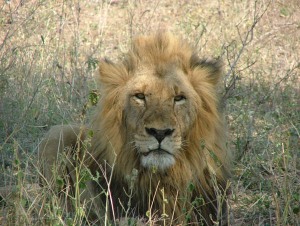The morning after we arrived at Simba Lodge in Buffalo Springs, the adjoining reserve to the flooded Samburu Reserve, we were informed that the Chinese road builders had repaired the bridge over the Ewaso Nyiro. Aleya, our one stranded Mentor on the other side, had walked across the bridge that morning to join the other mentors. Kura went to collect everyone so that they could meet us later that morning at Umoja village in Archers Post, adjacent to Samburu.
As we crossed the shaky bridge we could see the considerable damage inflicted on the area by the swollen river. The water treatment plant had been at one point under water and the smell of sewage was overwhelming. The rains in the Aberdare Mountains, the source of the Ewaso Nyiro, had brought a wall of water down the river, flooding the banks in just 30 minutes.
Kura had been in touch with David Daballen, an elephant researcher with Save the Elephant, and he told us that their camp had flooded so quickly that they had lost almost everything – laptops, research notes, all their clothes and supplies. David had been scheduled to meet with us on our last night in Samburu but now had to politely decline.
The sun was high and it was incredibly hot by the time we reached Umoja. This unique all-woman village was founded by Rebecca Lolosoli who had made it her life’s mission to rescue girls from forced early marriages and female genital mutilation. Rebecca has received considerable international acclaim for her work and on the day of our visit, she was in Washington, D.C., to receive an award from Vital Voices at an event at the Kennedy Center.
If Umoja is receiving funding for Rebecca’s work, it is not apparent in the village. Rebecca has been absent from the village for many months because of a dispute with her husband, who now is laying claim to the village land and the tourist bandas along the river. The village looks barely occupied and some of the cow dung houses are in need of repair. The nursery school that the women built years ago is bare with just desks and a blackboard for many small children who are very dirty. The nursery classroom smells strongly of urine. Some of the Dining For Women (DFW) travelers give gifts of pencils and school supplies to the two teachers, one of whom is a man.

Marsha Wallace, the head of Dining for Women, and her daughter, Anna Leese, with women from the Umoja village.
Rose, who substitutes for Rebecca in her absence, makes a presentation to the women about the plight of Samburu women. “Samburu women have nothing,” she tells us. “We have no rights, we are not allowed to own livestock or land, our fathers marry us off to get a few cattle, and we are forced to endure female circumcision, even though it is now illegal in Kenya.” When she is asked about her own personal story, she tells us that twenty years ago she was married off to an older man at age 14. She ran away and came to Umoja for safety from her family. “And do you have children here in the village?” the women ask her. Yes, she tells us, she has four children, ages 17 to age four. Her response is puzzling, since there is clearly no husband in this all-woman village. The best answer I can give as explanation is that she must have boyfriends, because she wants to have many children.
Rose invites all of us to join in some singing and dancing, and it is a joyous event for the DFW group. Just about everyone buys some of the beaded products that provide a source of income for the women. We move on into Samburu National Reserve and are treated to the sight of elephants crossing the road just in front of us. The drivers keep the vehicles running in case of a charge, but we barely register a look from this elephant family of mothers, aunts and babies.
We decide to attempt to reach our originally intended destination before the river flooded. As we approach, it is clear how high the river came, flooding the plains for over 300 yards. The Samburu Lodge reception is covered in three inches of mud and all the rooms are flooded. Vervet monkeys take advantage of the absence of guests to raid the bar area and dining room. The manager tells us that they had little time to move furniture or supplies as the river rose quickly and there were many crocodiles all over the grounds. “It was quite dangerous,” he tells us.
We return to the lodge for lunch, and that afternoon the Mentors and safari group are treated to their first lion sighting – first a young male and later two females with mature cubs. The animals that the Mentors have spent their whole lives avoiding, like elephants and lions, are now just a few feet away. “Mama Rungu, this is incredible, these lions, they are so close to us. No one will believe us at home.”



